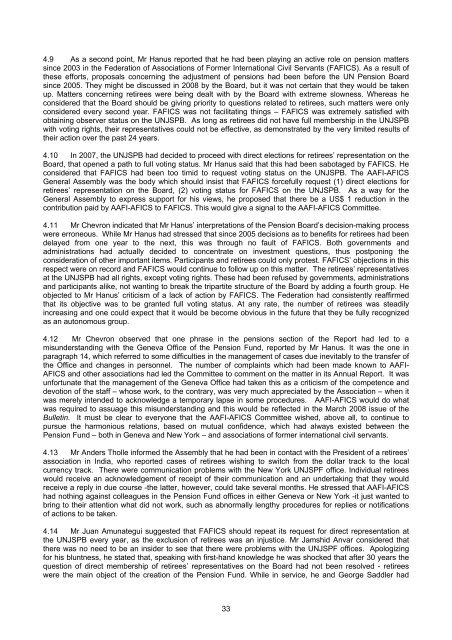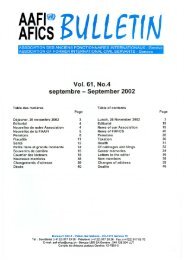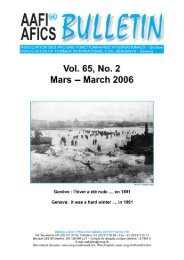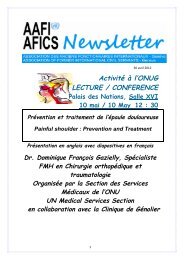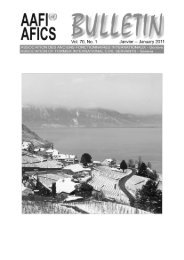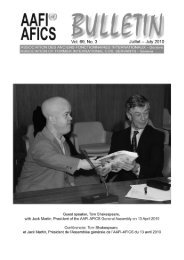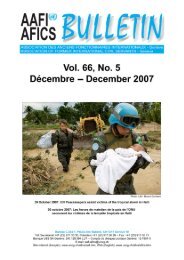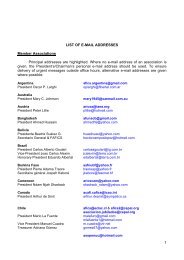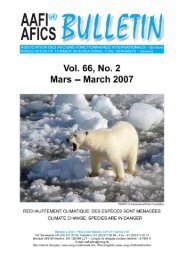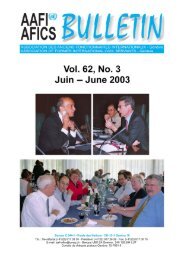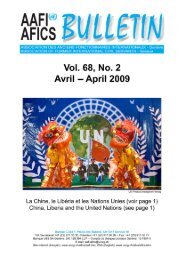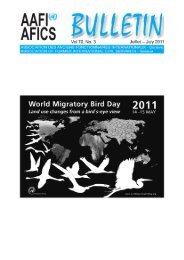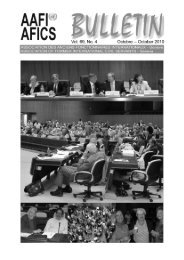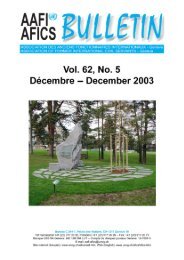VOL. 67, NO. 3 - AAFI-AFICS, Geneva - UNOG
VOL. 67, NO. 3 - AAFI-AFICS, Geneva - UNOG
VOL. 67, NO. 3 - AAFI-AFICS, Geneva - UNOG
You also want an ePaper? Increase the reach of your titles
YUMPU automatically turns print PDFs into web optimized ePapers that Google loves.
4.9 As a second point, Mr Hanus reported that he had been playing an active role on pension matters<br />
since 2003 in the Federation of Associations of Former International Civil Servants (F<strong>AFICS</strong>). As a result of<br />
these efforts, proposals concerning the adjustment of pensions had been before the UN Pension Board<br />
since 2005. They might be discussed in 2008 by the Board, but it was not certain that they would be taken<br />
up. Matters concerning retirees were being dealt with by the Board with extreme slowness. Whereas he<br />
considered that the Board should be giving priority to questions related to retirees, such matters were only<br />
considered every second year. F<strong>AFICS</strong> was not facilitating things – F<strong>AFICS</strong> was extremely satisfied with<br />
obtaining observer status on the UNJSPB. As long as retirees did not have full membership in the UNJSPB<br />
with voting rights, their representatives could not be effective, as demonstrated by the very limited results of<br />
their action over the past 24 years.<br />
4.10 In 2007, the UNJSPB had decided to proceed with direct elections for retirees’ representation on the<br />
Board, that opened a path to full voting status. Mr Hanus said that this had been sabotaged by F<strong>AFICS</strong>. He<br />
considered that F<strong>AFICS</strong> had been too timid to request voting status on the UNJSPB. The <strong>AAFI</strong>-<strong>AFICS</strong><br />
General Assembly was the body which should insist that F<strong>AFICS</strong> forcefully request (1) direct elections for<br />
retirees’ representation on the Board, (2) voting status for F<strong>AFICS</strong> on the UNJSPB. As a way for the<br />
General Assembly to express support for his views, he proposed that there be a US$ 1 reduction in the<br />
contribution paid by <strong>AAFI</strong>-<strong>AFICS</strong> to F<strong>AFICS</strong>. This would give a signal to the <strong>AAFI</strong>-<strong>AFICS</strong> Committee.<br />
4.11 Mr Chevron indicated that Mr Hanus’ interpretations of the Pension Board’s decision-making process<br />
were erroneous. While Mr Hanus had stressed that since 2005 decisions as to benefits for retirees had been<br />
delayed from one year to the next, this was through no fault of F<strong>AFICS</strong>. Both governments and<br />
administrations had actually decided to concentrate on investment questions, thus postponing the<br />
consideration of other important items. Participants and retirees could only protest. F<strong>AFICS</strong>’ objections in this<br />
respect were on record and F<strong>AFICS</strong> would continue to follow up on this matter. The retirees’ representatives<br />
at the UNJSPB had all rights, except voting rights. These had been refused by governments, administrations<br />
and participants alike, not wanting to break the tripartite structure of the Board by adding a fourth group. He<br />
objected to Mr Hanus’ criticism of a lack of action by F<strong>AFICS</strong>. The Federation had consistently reaffirmed<br />
that its objective was to be granted full voting status. At any rate, the number of retirees was steadily<br />
increasing and one could expect that it would be become obvious in the future that they be fully recognized<br />
as an autonomous group.<br />
4.12 Mr Chevron observed that one phrase in the pensions section of the Report had led to a<br />
misunderstanding with the <strong>Geneva</strong> Office of the Pension Fund, reported by Mr Hanus. It was the one in<br />
paragraph 14, which referred to some difficulties in the management of cases due inevitably to the transfer of<br />
the Office and changes in personnel. The number of complaints which had been made known to <strong>AAFI</strong>-<br />
<strong>AFICS</strong> and other associations had led the Committee to comment on the matter in its Annual Report. It was<br />
unfortunate that the management of the <strong>Geneva</strong> Office had taken this as a criticism of the competence and<br />
devotion of the staff – whose work, to the contrary, was very much appreciated by the Association – when it<br />
was merely intended to acknowledge a temporary lapse in some procedures. <strong>AAFI</strong>-<strong>AFICS</strong> would do what<br />
was required to assuage this misunderstanding and this would be reflected in the March 2008 issue of the<br />
Bulletin. It must be clear to everyone that the <strong>AAFI</strong>-<strong>AFICS</strong> Committee wished, above all, to continue to<br />
pursue the harmonious relations, based on mutual confidence, which had always existed between the<br />
Pension Fund – both in <strong>Geneva</strong> and New York – and associations of former international civil servants.<br />
4.13 Mr Anders Tholle informed the Assembly that he had been in contact with the President of a retirees’<br />
association in India, who reported cases of retirees wishing to switch from the dollar track to the local<br />
currency track. There were communication problems with the New York UNJSPF office. Individual retirees<br />
would receive an acknowledgement of receipt of their communication and an undertaking that they would<br />
receive a reply in due course -the latter, however, could take several months. He stressed that <strong>AAFI</strong>-<strong>AFICS</strong><br />
had nothing against colleagues in the Pension Fund offices in either <strong>Geneva</strong> or New York -it just wanted to<br />
bring to their attention what did not work, such as abnormally lengthy procedures for replies or notifications<br />
of actions to be taken.<br />
4.14 Mr Juan Amunategui suggested that F<strong>AFICS</strong> should repeat its request for direct representation at<br />
the UNJSPB every year, as the exclusion of retirees was an injustice. Mr Jamshid Anvar considered that<br />
there was no need to be an insider to see that there were problems with the UNJSPF offices. Apologizing<br />
for his bluntness, he stated that, speaking with first-hand knowledge he was shocked that after 30 years the<br />
question of direct membership of retirees’ representatives on the Board had not been resolved - retirees<br />
were the main object of the creation of the Pension Fund. While in service, he and George Saddler had<br />
33


